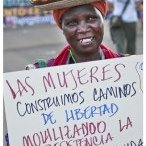English · Español

25 July 2017 | News | Resisting neoliberalism | Forests and biodiversity | Human rights | Gender | Food Sovereignty
Protagonists of History / July 25: International Day of Afro-descendant Women
By Friends of the Earth Latin America and the Caribbean
The struggle of the Garifuna indigenous people in Honduras, of the Amigos de San Isidro Cabañas Association (ASIC) in El Salvador or the resistance by Afro-descendant women against extractive activities in the North of Cauca, Colombia, share a close link. They are led by women who have made the defense of territories and local, millennial cultures and the environment, their life purpose.
In the case of Colombia and Honduras, these are black women, who have put the defense of people causes before their own lives, in a Latin American continent where the defense of dignity is often paid with death.
However, they are not paralyzed by fear. "Berta Cáceres was murdered for the lack of consultation around the Agua Zarca project, and the same is happening throughout all Garifuna communities, in all indigenous communities where people are persecuted, criminalized, imprisoned. We have people imprisoned and prosecuted because they are defending their common resources", said Miriam Miranda in an interview with Movimiento Madre Tierra - Friends of the Earth Honduras. Miranda is the coordinator of the Black Fraternal Organization of Honduras (OFRANEH). The leader has received many death threats.
According to Miriam, palm oil monoculture plantations and coal mine exploitation, among other factors, by transnational economic groups in numerous cases, are bringing serious pressure on the territories and Garifuna communities resisting in them and preserving common natural resources. "We stopped growing beans and rice to grow African palm, even in the hillsides. This has deeply affected the food sovereignty of the Honduran people", said Miriam. We are talking about a "neocolonial model", with the support of "racist, discriminatory enforcement systems that ignore international instruments related to the rights of indigenous people".
Meanwhile, Rina Navarrete, chair of the Amigos de San Isidro Cabañas Association (ASIC), of Cabañas department, El Salvador, stated in the interview conducted by CESTA - Friends of the Earth El Salvador, that "we are afraid, I won´t deny it, but we think about the future of our children and grandchildren, to leave a better environment for them". "I go to meetings and I´m afraid that I will get hurt and won´t come back home", she said with sadness and concern.
Rina, a single mother of two, became ASIC´s Chair in 2009 after the murder of his partner Marcelo Rivera, who was shot for denouncing the activities of Canadian mining corporation Pacific Rim, now Oceana Gold. As part of the resistance work against this company, ASIC aimed to have a stronger political influence and joined he Movement of Victims and People Affected by Climate Change and Corporations (MOVIAC). The environmental struggle did have a cost for the leader: "unknown men came to my office to look for me and as I was not there they threatened my colleagues and Board members, and demanded we stopped working in the area". Another struggle led by Rina is against the pollution of the Titihuapa River since 2007.
Meanwhile, for the Afro-descendant women of Cauca, in their resistance against extractive activities, the Ovejas River is a father and mother, it is one of the main forces of production and reproduction of life in the North of Cauca, states an article by CENSAT Agua Viva - Friends of the Earth Colombia. "Around it we see cultural constructions of different community councils and Afro communities of the department who have recovered water and lands in order to root their feelings and knowledge to a territory, after suffering for centuries the exclusion caused by a multiple domination system".
CENSAT highlights that the struggle of the Afro-descendant women of Cauca has been one of the bravest in the past years in Colombia. "They, keepers of joy and freedom, have contributed to the articulation of the Black Communities Process (PCN) with the support of indigenous people, to remove backhoes from their water and mountains; they have made denunciations at national and international level and have started negotiations with the government", which have not reached the expected outcomes. In addition, the women hold artistic-cultural representations and they are obstinately instilling the anti-colonial, anti-patriarchal and anti-capitalist resistance in their sons and daughters.
In 2005, the women from Cauca organized a Mobilization of Afro-descendant Women for Life and Ancestral Territories. Over 100 people, most of them women, marched for 500 kilometers among the Andean mountains that separate Bogota, capital of Colombia, and the North of Cauca, aiming to shed light on the threats against their ways of living and demand an immediate stop to these threats.
In the words of Miriam Miranda of Honduras "women play an extremely important role in the resistance, fighting at many levels within the community, especially if they are mothers who decide to fight for the defense of common natural resources". For Rina, in El Salvador, the efforts are worth it, especially after the country passed a law against metal mining a few months ago. Meanwhile, in Colombia, CENSAT states that black women from the North of Cauca recognize the blood shed for their lands and that their freedom came at the cost of death. "That´s why the territory, as a realization of popular dignity, cannot be sold. They, living memory, cry of the oppressed, voices of the rivers and lands, are also the territory".
ATALC pays homage to all Afro-descendant women in their day. But especially those who are part of the different struggles in our continent in defense of common resources, social and environmental justice and peoples´ rights. Struggles that continue the anticolonial and antiracist historical fights, which are also so current. In a regional context of persecution against territorial and human rights defenders, their courage and dignity inspire us.
* The interviews referred to above were especially conducted for this report.
Imagen: https://www.flickr.com/photos/prensarural/







